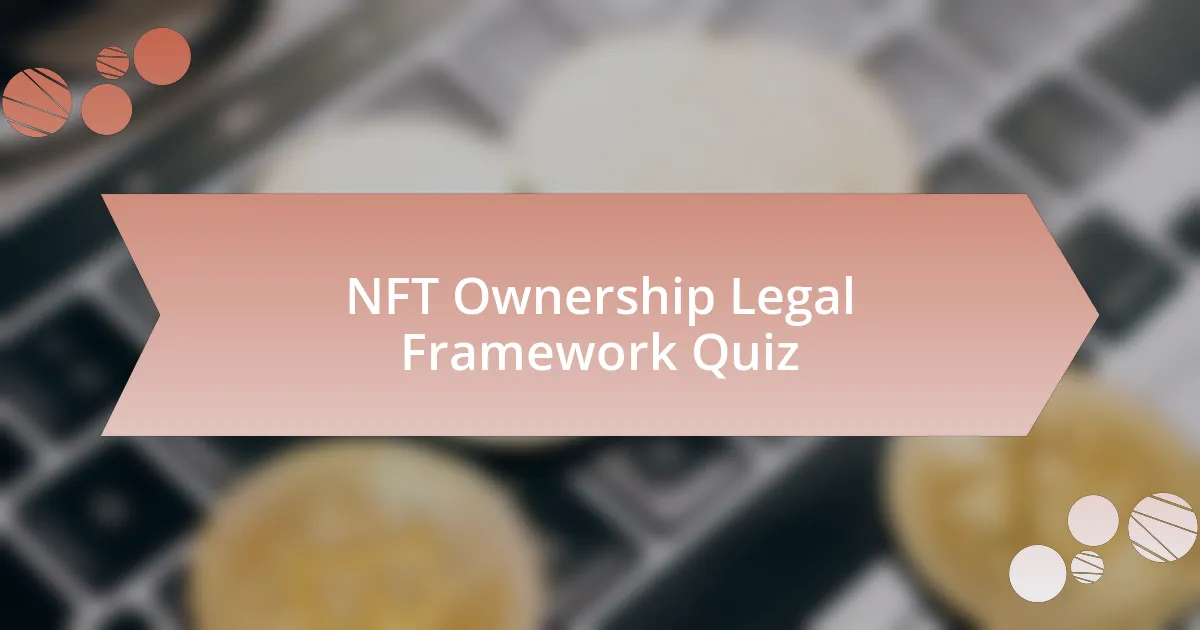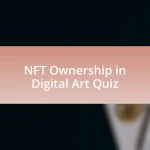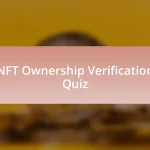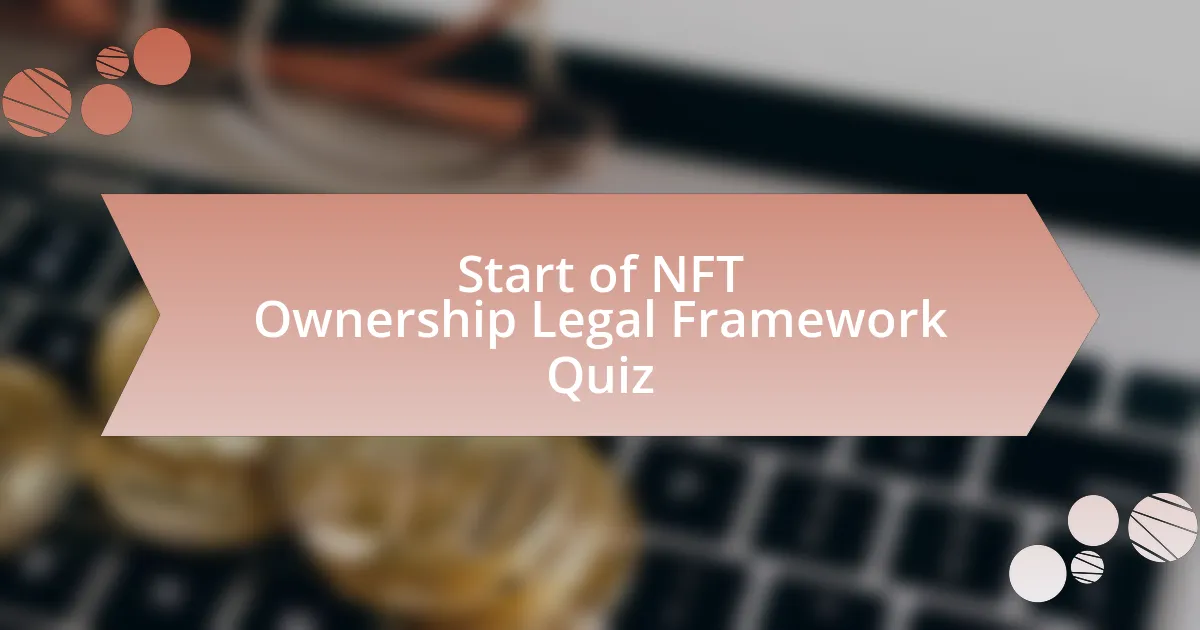
Start of NFT Ownership Legal Framework Quiz
1. What is the primary legal concern when creating NFTs?
- Ensuring creators have the necessary rights and licenses to use copyrighted or trademarked content.
- Making sure that all NFTs are sold at fixed prices only.
- Guaranteeing that NFTs can be easily resold without any conditions.
- Verifying the financial stability of NFT buyers before transactions.
2. What percentage of NFTs minted on the Ethereum blockchain potentially infringe on existing copyrights?
- 10%
- 25%
- 50%
- 80%
3. What must NFT creators do to avoid legal issues?
- Create NFTs without considering any intellectual property laws.
- Use any existing art without proper citations, as long as it’s digital.
- Ignore copyright owners and rely solely on blockchain technology.
- Obtain explicit permission from the copyright owner, clearly define ownership and usage rights, and implement measures to prevent unauthorized minting.
4. What is the purpose of using NFT platforms with built-in copyright protection features?
- To prevent unauthorized minting of NFTs using copyrighted content.
- To create more profitable digital artworks for creators.
- To simplify the process of buying and selling NFTs.
- To promote a secondary market for NFT exchanges.
5. What is the legal status of NFTs in terms of intellectual property rights?
- NFTs have no legal protection and can be freely copied by anyone.
- NFTs can be protected under copyright law if the underlying content meets the statutory requirements.
- NFTs are automatically protected under trademark law regardless of the content.
- NFTs are considered securities in all jurisdictions without exception.
6. What are the exclusive rights granted to a copyright owner under the Copyright Act?
- The exclusive right to destroy all copies of the work.
- The exclusive right to sell any version of the work without permission.
- The exclusive rights to make copies, distribute, perform, display, and create derivative works of the copyrighted work.
- The exclusive right to license the work to anyone without limitations.
7. How do smart contracts relate to NFT transactions?
- Smart contracts generate random NFT artwork during minting.
- Smart contracts are used to determine NFT valuation before sale.
- Smart contracts eliminate the need for blockchain in NFT transactions.
- Smart contracts can automate royalty payments and resale rights for creators.
8. What is the challenge in enforcing royalty payments and resale rights for creators?
- The high costs associated with minting NFTs.
- The technical complexities involved in creating digital art.
- The limited audience for NFTs in the marketplace.
- The lack of clear legal precedents and the decentralized nature of NFT transactions.
9. What are the potential disputes related to NFT ownership, fraud, and intellectual property infringement?
- Disputes regarding traditional asset ownership and market volatility issues.
- Disputes focusing solely on currency valuation and stock market trends.
- Disputes related to ownership, fraud, and intellectual property infringement are likely to arise due to the decentralized and global nature of NFT transactions.
- Disputes stemming from interest rates and commodity exchange regulations.
10. How do courts and authorities assert jurisdiction over NFT-related transactions?
- The legal status of NFTs and applicable laws may vary depending on the jurisdiction, leading to potential conflicts of laws and enforcement challenges.
- Authorities can ignore jurisdictional issues since NFTs are universally recognized.
- Courts rely solely on the location of the buyer to establish jurisdiction over all NFT transactions.
- Jurisdiction is automatically assigned based on the platform used for the NFT transaction.
11. What should NFT marketplaces and platforms implement to mitigate risks?
- Robust dispute resolution mechanisms.
- Limited buyer verification.
- No copyright enforcement.
- Loose registration processes.
12. What is the significance of licensing in NFT transactions?
- NFTs automatically grant full copyright ownership to buyers without restrictions.
- Every NFT transaction allows unlimited commercial use of the content without agreements.
- Licensing is irrelevant in NFT transactions, as ownership implies all rights.
- Many NFT transactions provide a narrow license grant to use the NFT content with various restrictions or limits.
13. Can possession or control of an NFT grant the exclusive right to use the NFT in any manner?
- Yes, possessing an NFT gives the right to use it freely without limitations.
- No, an NFT can only be used in ways specified by its creator.
- No, possession or control of an NFT does not necessarily grant the exclusive right to use the NFT in any manner.
- Yes, ownership of an NFT automatically includes all rights to use the underlying content.
14. How do NFTs differ from traditional assets in terms of fungibility?
- NFTs are interchangeable and can be exchanged on a one-for-one basis like currencies.
- NFTs are identical, allowing them to be easily traded for one another like stocks.
- NFTs are non-fungible, meaning each token is unique or one of a kind, unlike fungible assets like coins or paper money.
- NFTs can be divided into smaller units, making them widely interchangeable like commodities.
15. What is the analogy between NFTs and traditional assets?
- NFTs resemble currency, which can be spent in any amount without uniqueness.
- NFTs are like paintings, sculptures, or original written manuscripts, which are certified as one-of-a-kind.
- NFTs are similar to stocks, which can be easily traded and exchanged for cash.
- NFTs behave like bonds, providing a guaranteed return with stable value over time.
16. What are the main legal considerations in the NFT space?
- The main legal considerations include software coding practices, blockchain scalability, and digital currency regulations.
- The main legal considerations include social media presence, marketing strategies, and website design.
- The main legal considerations include intellectual property rights, licensing issues, and regulatory compliance.
- The main legal considerations include tax evasion, digital art originality, and encryption protocols.
17. What happens if an NFT is created using content that infringes someone else’s rights?
- The buyer may lose the asset, and the project creator may face a costly IP dispute.
- The NFT becomes untradeable and is deleted from the blockchain.
- The NFT is automatically converted into a legal asset.
- The creator earns a profit and faces no consequences.
18. Can NFTs be adjacent to criminal activity?
- No, NFTs cannot be connected to illegal behavior.
- Yes, bad actors who engage in fraudulent activity via NFTs raise alarms.
- Yes, they are always used for legitimate purposes.
- No, NFTs promote only artistic expression.
19. What is the legal status of NFTs in the United States?
- NFTs have not been defined as securities or commodities at the U.S. federal level, and laws applicable to NFTs depend on their classification.
- NFTs are banned across all states in the United States.
- NFTs are classified solely as securities in the U.S.
- NFTs are considered legal currency under U.S. law.
20. Are profits from the sale of NFTs subject to capital gains tax?
- No, profits from the sale of NFTs are exempt from tax.
- Yes, profits from the sale of NFTs are subject to income tax only.
- Yes, profits from the sale of NFTs are subject to capital gains tax.
- No, profits from the sale of NFTs are not taxable.
21. What is the role of smart contracts in transferring copyright through NFT sales?
- Smart contracts can transfer copyright through legally binding agreements if the creator chooses to do so.
- Smart contracts generate new NFTs without any legal implications.
- Smart contracts are only used for transaction fees and have no relation to copyright.
- Smart contracts automatically grant all copyright rights to the buyer without consent.
22. How do NFTs intersect with intellectual property law?
- NFTs create absolute ownership rights without any licensing concerns.
- NFTs are solely about digital art and have no connection to intellectual property law.
- NFTs raise significant questions about copyright and licensing issues, particularly regarding the transfer of rights to reproduce or distribute the artwork.
- NFTs allow anyone to use the underlying content freely without restrictions.
23. What are the legal implications of owning NFTs?
- Owning NFTs means you automatically own the original works and can sell them freely.
- Owning NFTs grants exclusive rights to all underlying content without restrictions.
- Owning NFTs requires no legal understanding or compliance with laws.
- Owning NFTs involves several legal considerations, including intellectual property rights, securities laws, anti-money laundering compliance, and tax implications.
24. Can NFTs be seen as investment contracts?
- No, NFTs cannot ever be considered investment contracts.
- No, NFTs are always viewed as digital collectibles and not investments.
- Yes, in some cases, NFTs can be seen as investment contracts, which may bring them under the purview of securities laws.
- Yes, all NFTs automatically qualify as traditional investments.
25. How does the marketing and sale of an NFT influence its legal classification?
- The specifics of how an NFT is marketed and sold can influence whether it is treated as a security.
- The creator`s social media following determines the NFT`s legal status.
- The NFT must be resold a certain number of times to change its classification.
- The price of the NFT dictates its legal classification.
26. What is the significance of understanding intellectual property law for both creators and buyers of NFTs?
- Understanding intellectual property law is crucial for both creators and buyers to navigate the complexities of NFT transactions.
- Buyers only need to know about blockchain technology, not intellectual property law.
- Intellectual property law is irrelevant to NFT sales and purchases.
- Creators should ignore intellectual property law when creating NFTs.
27. What is the difference between owning an NFT and owning the original work it represents?
- Owning an NFT means you can sell the original work without permission.
- Owning an NFT means owning a copy of the work, not the original work or the rights to reproduce it.
- Owning an NFT allows you to control how the original work is used and displayed.
- Owning an NFT gives you the same rights as the original owner of the work.
28. Can an NFT be protected under trademark law?
- No, NFTs are not eligible for trademark protection under any circumstances.
- Yes, an NFT can be protected under trademark law if it meets specific criteria.
- Yes, but only if the NFT is a digital currency.
- No, NFTs can only be protected under copyright law.
29. What is the purpose of defining ownership and usage rights associated with an NFT?
- To determine the resale value of the NFT in the future.
- To specify whether the buyer obtains the full copyright or only a limited license.
- To establish the format in which the NFT can be displayed.
- To outline the aesthetic qualities of the NFT artwork.
30. How do courts handle disputes related to NFT ownership and intellectual property infringement?
- Courts face challenges in asserting jurisdiction and enforcing rulings due to the decentralized nature of NFTs.
- Courts resolve NFT disputes exclusively through arbitration processes.
- Courts ignore NFT disputes, delegating them entirely to private platforms.
- Courts typically rule in favor of whoever holds the NFT without considering other factors.

Quiz Successfully Completed!
Congratulations on completing the quiz on NFT Ownership Legal Framework! You have taken an important step in enhancing your understanding of a complex but fascinating topic. The legal landscape surrounding NFTs is constantly evolving, and your knowledge will help you navigate this space more effectively.
During the quiz, you may have discovered key terms and concepts related to NFT ownership, intellectual property rights, and the regulatory framework. These insights are essential as they form the basis for comprehending how NFTs fit into existing legal structures. Understanding these elements not only benefits collectors and creators but also fosters a healthier digital marketplace.
We invite you to delve deeper into this subject by checking out the next section on this page. It contains valuable information that can further expand your knowledge about the NFT ownership legal framework. Whether you’re a seasoned professional or just curious, there’s always more to learn. Enjoy exploring!
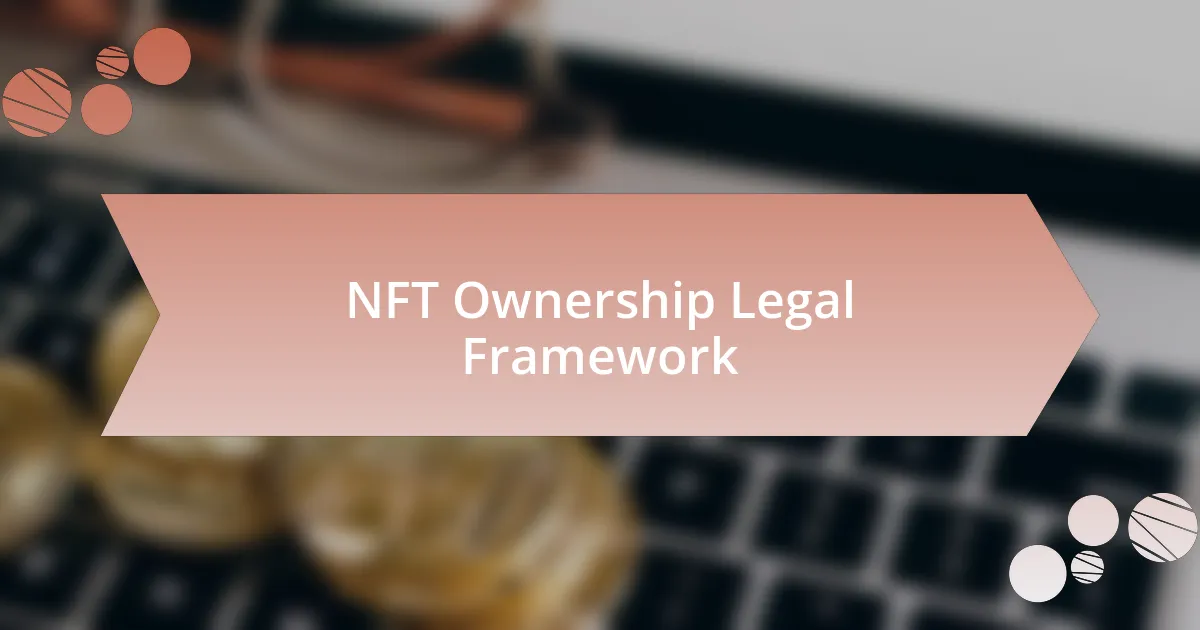
NFT Ownership Legal Framework
Understanding NFT Ownership
NFT ownership refers to the legal rights associated with non-fungible tokens, digital assets that represent ownership of unique items or artwork on a blockchain. When an individual owns an NFT, they possess a unique token that serves as proof of ownership and authenticity. In many jurisdictions, owning an NFT does not necessarily confer copyright or intellectual property rights over the underlying asset. Instead, the owner typically holds the right to sell or transfer the token.
The Legal Status of NFTs
The legal status of NFTs varies across jurisdictions and remains a developing area within law. In some cases, NFTs are treated as digital goods, while in others, they might be regarded as securities or intellectual property. Regulatory bodies are beginning to create frameworks to classify NFTs, which will influence ownership rights and obligations, tax implications, and compliance with laws such as anti-money laundering regulations.
Copyright and Intellectual Property Rights in NFT Transactions
When purchasing an NFT, buyers often assume that ownership includes intellectual property rights. However, this is often not the case. The original creator retains copyright unless explicitly transferred in the sale agreement. NFT platforms may or may not provide clarity on rights during transactions, leading buyers to misunderstand what their purchase entails beyond mere ownership of the token.
Consumer Protection Laws in NFT Purchases
Consumer protection laws apply to NFT ownership, similar to traditional goods. Buyers are entitled to clear information about NFTs, including any terms related to ownership transfer and the rights attached to the asset. Regulatory authorities are focused on enforcing transparency and fairness in NFT transactions, highlighting the importance of clarity in sales agreements to protect consumers.
Future Developments in NFT Ownership Law
The legal framework surrounding NFT ownership is rapidly evolving. Ongoing litigation and regulatory scrutiny will influence the development of clear laws governing NFTs. Emerging standards for ownership rights, licensing, and digital asset management suggest that future legislation will need to integrate technological changes and address the unique nature of digital ownership.
What is NFT Ownership?
NFT ownership refers to the legal entitlement a person holds over a non-fungible token, a unique digital asset verified using blockchain technology. Ownership includes rights to transfer, sell, or display the NFT, contingent on the specific rights granted by the creator. Legal frameworks, such as copyright laws, influence these ownership rights, ensuring that creators maintain control over the underlying intellectual property.
How is NFT Ownership Legally Enforced?
NFT ownership is legally enforced through the blockchain, which provides a secure and immutable record of ownership transfer. Each transaction is public, ensuring transparency. Additionally, traditional contracts may accompany NFTs, outlining the specific rights and restrictions that apply, further reinforcing legal claims. Courts have started to recognize these ownership claims, citing blockchain records as valid evidence in disputes.
Where is NFT Ownership Regulated?
NFT ownership is regulated in various jurisdictions, primarily under intellectual property and contract law. Different countries have developing legislation around cryptocurrencies and digital assets, which increasingly affects NFT regulations. For instance, the United States has seen significant legal discourse about NFTs, addressing issues like copyright and securities law, while countries like France have begun establishing clearer guidelines for digital assets.
When did NFT Ownership Become a Legal Concern?
NFT ownership became a legal concern around 2020 when NFTs gained mainstream popularity. High-profile sales, such as Beeple’s digital artwork selling for $69 million, prompted discussions about ownership rights and intellectual property implications. As more individuals invested in NFTs, a need for legal clarity emerged, driving awareness among creators and buyers regarding their rights and obligations.
Who Oversees NFT Ownership Issues?
NFT ownership issues are overseen by various entities, including regulatory agencies, copyright offices, and courts. In the United States, organizations like the Securities and Exchange Commission (SEC) may intervene if an NFT is classified as a security. Legal professionals, intellectual property experts, and blockchain organizations also play critical roles in advising on copyright and ownership disputes, contributing to the evolving landscape of NFT legislation.

